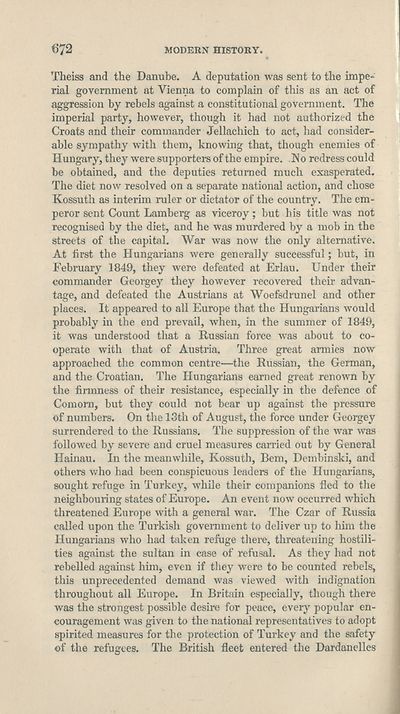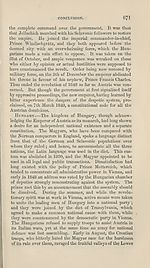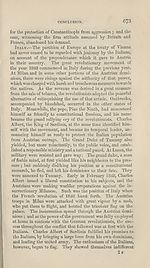Download files
Complete book:
Individual page:
Thumbnail gallery: Grid view | List view

672
MODERN HISTORY.
Theiss and the Danube. A deputation was sent to the impe¬
rial government at Vienna to complain of this as an act of
aggression by rebels against a constitutional government. The
imperial party, however, though it had not authorized the
Croats and their commander Jellachich to act, had consider¬
able sympathy with them, knowing that, though enemies of
Hungary, they were supporters of the empire. . IS o redress could
be obtained, and the deputies returned much exasperated.
The diet now resolved on a separate national action, and chose
Kossuth as interim ruler or dictator of the country. The em¬
peror sent Count Lamberg as viceroy; but his title was not
recognised by the diet, and he was murdered by a mob in the
streets of the capital. War was now the only alternative.
At first the Hungarians were generally successful; but, in
February 1849, they were defeated at Erlau. Under their
commander Georgey they however recovered their advan¬
tage, and defeated the Austrians at Woefsdrunel and other
places. It appeared to all Europe that the Hungarians would
probably in the end prevail, when, in the summer of 1849,
it was understood that a Russian force was about to co¬
operate with that of Austria. Three great armies now
approached the common centre—the Russian, the German,
and the Croatian. The Hungarians earned great renown by
the firmness of their resistance, especially in the defence of
Comorn, but they could not bear up against the pressure
of numbers. On the 13th of August, the force under Georgey
surrendered to the Russians. The suppression of the war was
followed by severe and cruel measures can-ied out by General
Hainau. In the meanwhile, Kossuth, Bern, Dembinski, and
others who had been conspicuous leaders of the Hungarians,
sought refuge in Turkey, while their companions fled to the
neighbouring states of Europe. An event now occurred which
threatened Europe with a general war. The Czar of Russia
called upon the Turkish government to deliver up to him the
Hungarians who had taken refuge there, threatening hostili¬
ties against the sultan in case of refusal. As they had not
rebelled against him, even if they were to be counted rebels,
this unprecedented demand was viewed with indignation
throughout all Europe. In Britain especially, though there
was the strongest possible desire for peace, every popular en¬
couragement was given to the national representatives to adopt
spirited measures for the protection of Turkey and the safety
of the refugees. The British fleet entered the Dardanelles
MODERN HISTORY.
Theiss and the Danube. A deputation was sent to the impe¬
rial government at Vienna to complain of this as an act of
aggression by rebels against a constitutional government. The
imperial party, however, though it had not authorized the
Croats and their commander Jellachich to act, had consider¬
able sympathy with them, knowing that, though enemies of
Hungary, they were supporters of the empire. . IS o redress could
be obtained, and the deputies returned much exasperated.
The diet now resolved on a separate national action, and chose
Kossuth as interim ruler or dictator of the country. The em¬
peror sent Count Lamberg as viceroy; but his title was not
recognised by the diet, and he was murdered by a mob in the
streets of the capital. War was now the only alternative.
At first the Hungarians were generally successful; but, in
February 1849, they were defeated at Erlau. Under their
commander Georgey they however recovered their advan¬
tage, and defeated the Austrians at Woefsdrunel and other
places. It appeared to all Europe that the Hungarians would
probably in the end prevail, when, in the summer of 1849,
it was understood that a Russian force was about to co¬
operate with that of Austria. Three great armies now
approached the common centre—the Russian, the German,
and the Croatian. The Hungarians earned great renown by
the firmness of their resistance, especially in the defence of
Comorn, but they could not bear up against the pressure
of numbers. On the 13th of August, the force under Georgey
surrendered to the Russians. The suppression of the war was
followed by severe and cruel measures can-ied out by General
Hainau. In the meanwhile, Kossuth, Bern, Dembinski, and
others who had been conspicuous leaders of the Hungarians,
sought refuge in Turkey, while their companions fled to the
neighbouring states of Europe. An event now occurred which
threatened Europe with a general war. The Czar of Russia
called upon the Turkish government to deliver up to him the
Hungarians who had taken refuge there, threatening hostili¬
ties against the sultan in case of refusal. As they had not
rebelled against him, even if they were to be counted rebels,
this unprecedented demand was viewed with indignation
throughout all Europe. In Britain especially, though there
was the strongest possible desire for peace, every popular en¬
couragement was given to the national representatives to adopt
spirited measures for the protection of Turkey and the safety
of the refugees. The British fleet entered the Dardanelles
Set display mode to:
![]() Universal Viewer |
Universal Viewer | ![]() Mirador |
Large image | Transcription
Mirador |
Large image | Transcription
| Antiquarian books of Scotland > Education > Elements of universal history on a new and systematic plan > (692) |
|---|
| Permanent URL | https://digital.nls.uk/127588444 |
|---|
| Description | Thousands of printed books from the Antiquarian Books of Scotland collection which dates from 1641 to the 1980s. The collection consists of 14,800 books which were published in Scotland or have a Scottish connection, e.g. through the author, printer or owner. Subjects covered include sport, education, diseases, adventure, occupations, Jacobites, politics and religion. Among the 29 languages represented are English, Gaelic, Italian, French, Russian and Swedish. |
|---|

